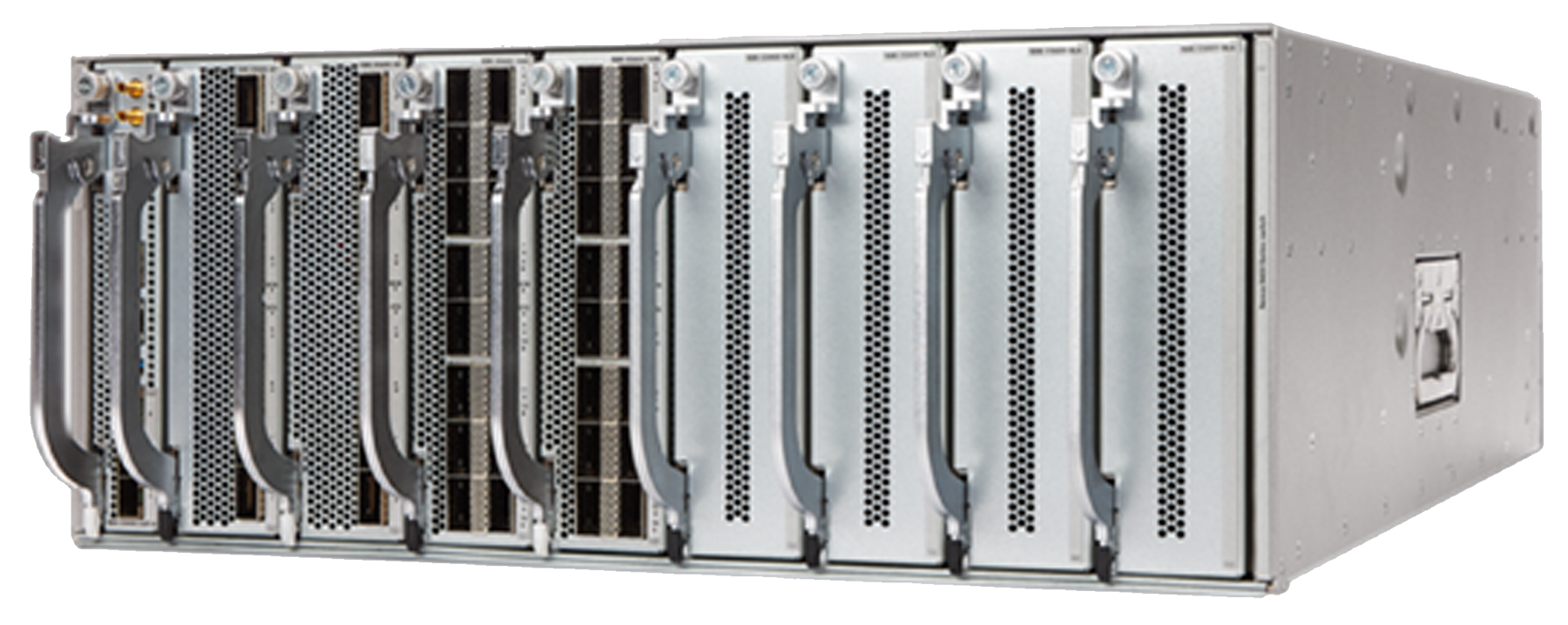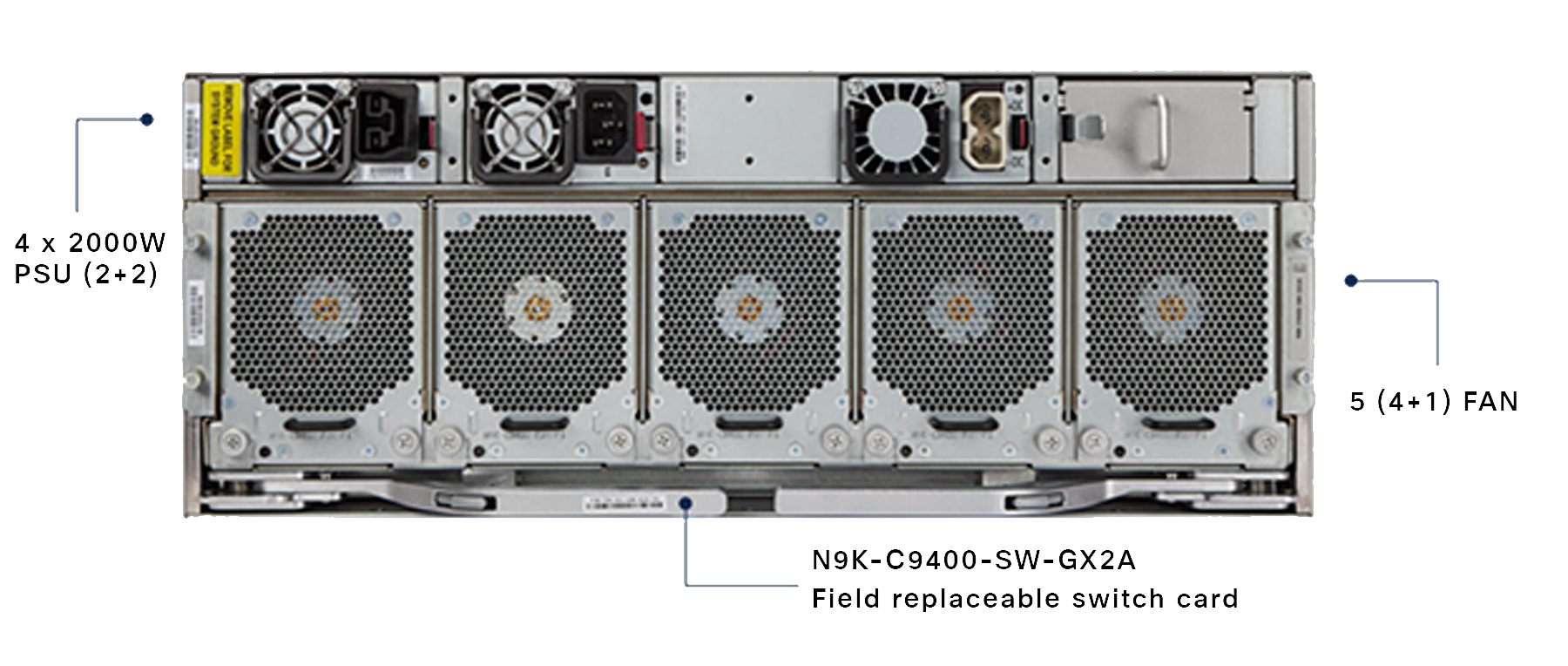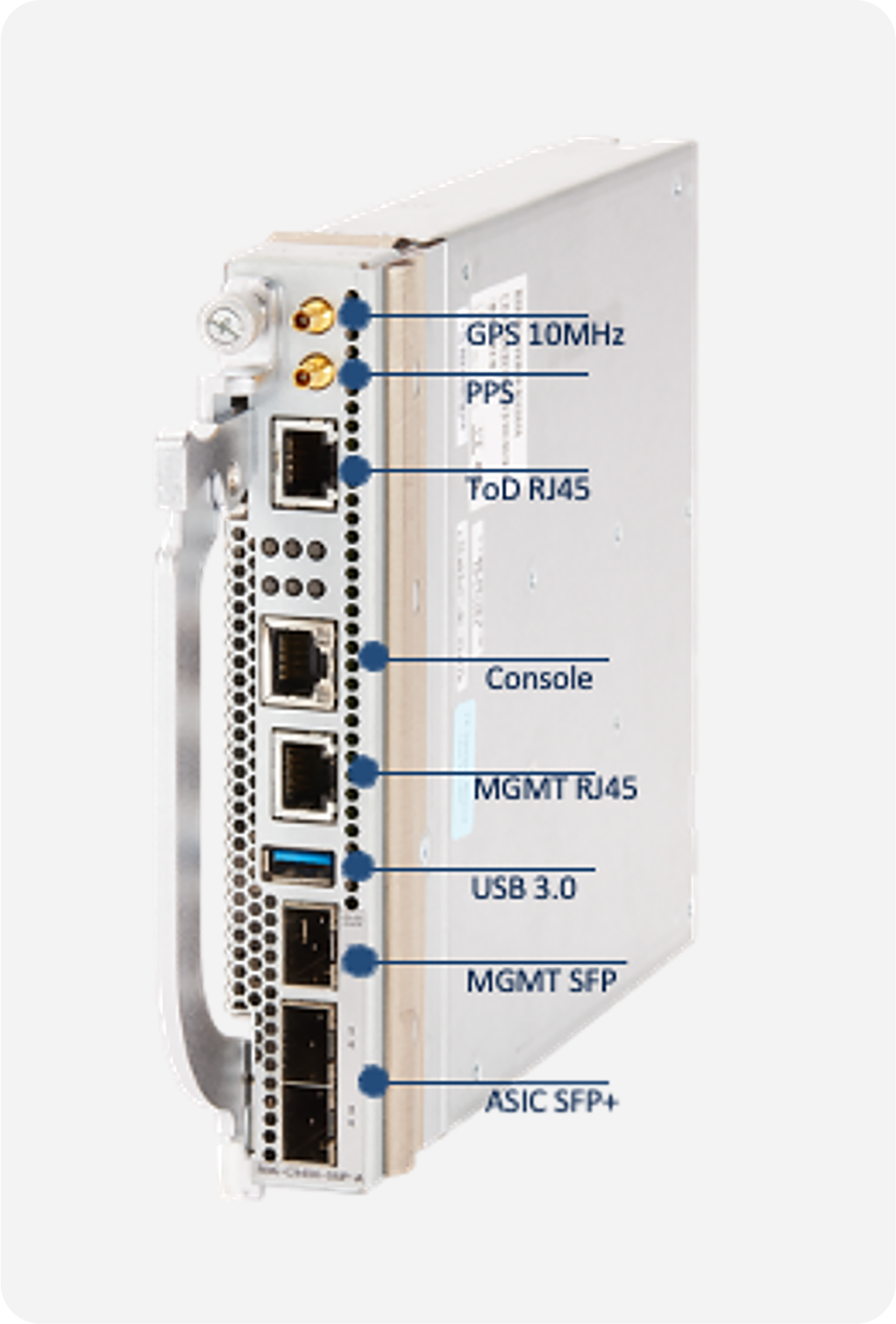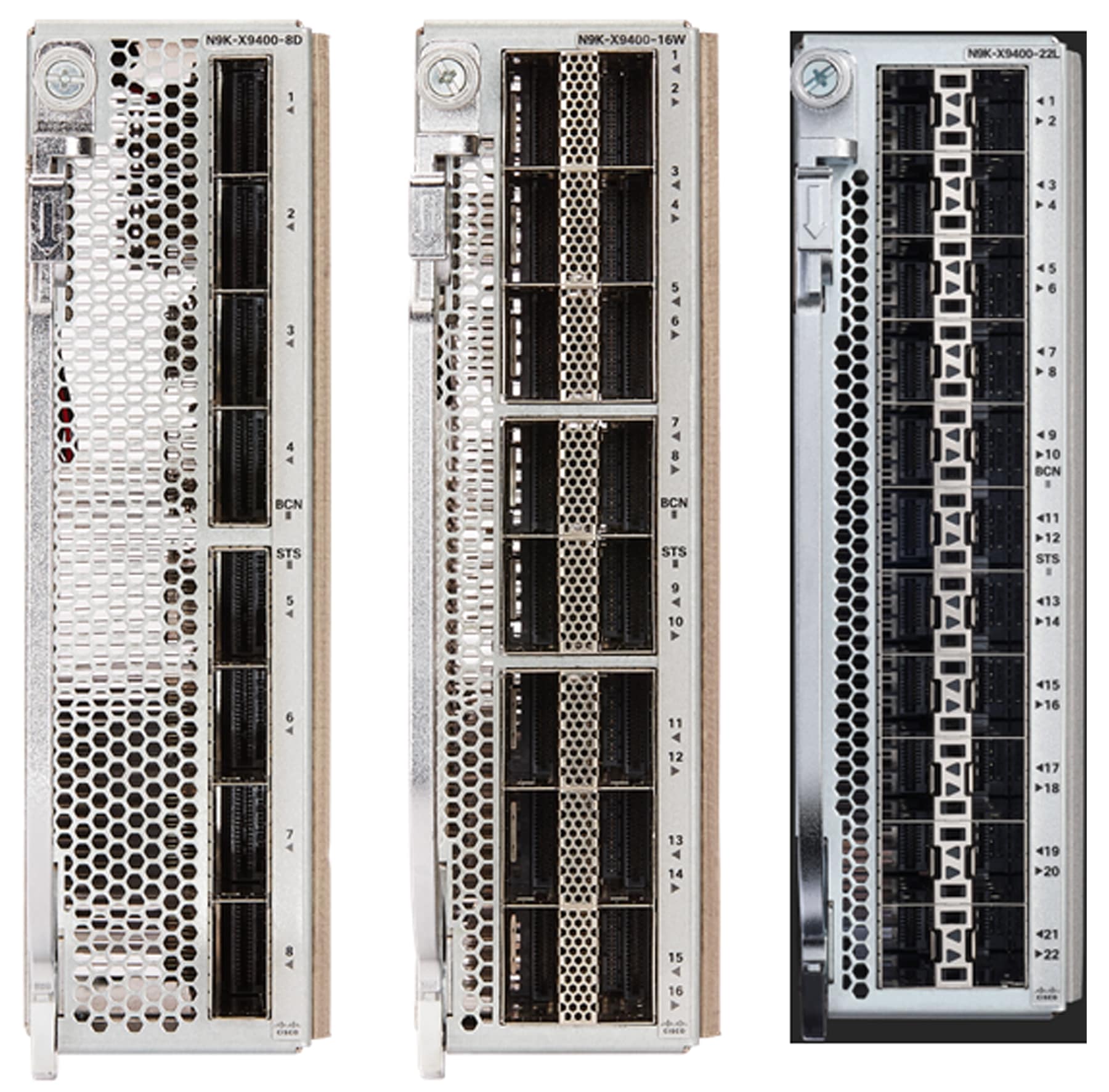Cisco Nexus 9400 Series Switches Data Sheet
Available Languages
Bias-Free Language
The documentation set for this product strives to use bias-free language. For the purposes of this documentation set, bias-free is defined as language that does not imply discrimination based on age, disability, gender, racial identity, ethnic identity, sexual orientation, socioeconomic status, and intersectionality. Exceptions may be present in the documentation due to language that is hardcoded in the user interfaces of the product software, language used based on RFP documentation, or language that is used by a referenced third-party product. Learn more about how Cisco is using Inclusive Language.
Cisco Nexus® 9400 Series Switches provide high-density 400G solutions in a centralized modular chassis design.
The Cisco Nexus 9400 Series centralized modular switches expand the Cisco Nexus 9000 Series portfolio with a new chassis that supports very high port-density 400 Gigabit expansion modules.
As data centers continue to evolve to support next-generation applications such as machine learning that drive massive growth in intra-data-center traffic bandwidth, data-center operators require compact, high-capacity, and highly efficient switches to upgrade data-center fabrics. They need security, automation, visibility, analytics, and assurance. Equipped to support this next-generation cloud architecture, the Cisco Nexus 9400 series switches are based on Cisco Cloud Scale technology.
The Cisco Nexus 9400 series centralized modular architecture can scale up to 25.6 Tbps with a combination of field-replaceable switch cards, expansion modules, power supplies, and fans.
The Cisco Nexus 9400 Series Switch has a new design with a height of 4 rack units and a depth of 24 inches including 8 expansion slots to support 64 ports of 400G, or 128 ports of 200G, or 176 ports of 10/25/50G, with MACsec capability on all ports.
Furthermore, the chassis architecture supports a supervisor and up to 8 expansion modules, fan tray redundancy with 5 fan trays, and power supply redundancy.
The Cisco Nexus 9400 series supports Precision Time Protocol (PTP) with Class C timing accuracy for telecom as well as media profiles. Through PTP and synchronous Ethernet, it delivers frequency and time distribution with high accuracy.
Cisco provides two modes of operation for Cisco Nexus 9000 Series Switches. Organizations can deploy Cisco® Application Centric Infrastructure (Cisco ACI®) or Cisco NX-OS mode.

Cisco Nexus 9400 Series Switch front-side

Cisco Nexus 9400 Series Switch rear-side

Cisco Nexus 9400 Series supervisor front-side

Cisco Nexus 9400 Series LEMs (N9K-X9400-8D, N9K-X9400-16W, and N9K-X9400-22L)
Table 1. Cisco Nexus 9400 Series LEMs
| Model |
Description |
MACsec |
| N9K-X9400-8D |
8p 400G QSFP-DD |
All ports |
| N9K-X9400-16W |
16p 200G QSFP56 |
All ports |
| N9K-X9400-22L |
22p 10/25/50G SFP56 |
All ports |
The Cisco Nexus 9400-GX2 series switches provide the following features and benefits:
Table 2. Features and benefits
| Features |
Description and benefits |
| Architectural flexibility |
Cisco Nexus 9000 Series Switches support Cisco NX-OS VXLAN EVPN, Cisco Application Centric Infrastructure (Cisco ACI), Cisco IP Fabric for Media, Cisco Nexus Dashboard Data Broker, and IP-routed or Ethernet-switched Layer-2 fabrics using a comprehensive set of unicast and multicast IPv6/IPv4 and Ethernet protocols.
● Purpose-built Cisco NX-OS Software operating system with comprehensive, proven innovations. The operating system is modular, with a dedicated process for each routing protocol: a design that isolates faults while increasing availability.
● Industry-leading Cisco software-defined networking (SDN) solution with Cisco ACI support. Cisco ACI is a holistic, intent-driven architecture with centralized automation and policy-based application profiles.
● Support for standards-based VXLAN EVPN fabrics, inclusive of hierarchical multisite support (Refer to VXLAN network with MP-BGP EVPN control plane for more information).
● Three-tier BGP architectures, enabling horizontal, nonblocking IPv6 network fabrics at web scale.
● Comprehensive protocol support for Layer-3 (v4 and v6) unicast and multicast routing protocol suites, including BGP, Open Shortest Path First (OSPF), Enhanced Interior Gateway Routing Protocol (EIGRP), Routing Information Protocol Version 2 (RIPv2), Protocol Independent Multicast Sparse Mode (PIM-SM), Source-Specific Multicast (SSM), and Multicast Source Discovery Protocol (MSDP).
● Segment routing (SR and SRv6) allows the network to forward multiprotocol label switching (MPLS) packets and to engineer traffic without Resource Reservation Protocol (RSVP) traffic engineering (TE). It provides a control-plane alternative for increased network scalability and virtualization. Cisco IP Fabric for Media helps you migrate from an SDI router to an IP-based infrastructure. In an IP-based infrastructure, a single cable has the capacity to carry multiple bidirectional traffic flows and can support different flow sizes without requiring changes to the physical infrastructure.
● Nexus Dashboard Data Broker provides customers with complete observability into their network and solution(s) that can help them identify and mitigate security threats, realize and remediate performance bottlenecks, adhere to data compliance, and have insight into capacity-planning operations.
|
| Extensive programmability |
● Day-0 automation through Power-On Auto Provisioning (POAP), drastically reducing provisioning time.
● Industry-leading integrations for leading DevOps configuration management applications, such as Ansible. Extensive native YANG and industry-standard OpenConfig model support through RESTCONF/NETCONF/gNMI.
● REST API interacting with Data Management Engine (DME).
● Model-driven telemetry, which enhances network observability.
● Third-party application hosting using Cisco Application Framework (CAF).
|
| High scalability, flexibility, and security |
● Flexible forwarding tables support up to two million shared entries.
● IEEE 802.1ae MAC Security (MACsec) capability on all ports allows traffic encryption at the physical layer and provides secure server, border leaf, and leaf-to-spine connectivity.
|
| AI/ML networking |
● Priority Flow Control (PFC) is a key capability supported on Cisco Nexus 9000 Series Switches that prevents Ethernet frame drops by signaling, controlling, and managing Ethernet flows along the path by sending pause frames to appropriate senders.
● The platform also supports Explicit Congestion Notification (ECN), which provides end-to-end notification per IP flow by marking packets that experienced congestion, without dropping traffic. The platform is capable of tracking ECN statistics, including the number of marked packets that have experienced congestion.
● The platform offers lossless transport for Remote Direct Memory Access (RDMA) over Converged Ethernet (RoCE) with the support of data-center bridging (DCB) protocols.
◦ Enhanced Transmission Selection (ETS) reserves bandwidth per priority class in network contention situations. ◦ Data Center Bridging Exchange Protocol (DCBX) can discover and exchange priority and bandwidth information with endpoints.
● Weighted Random Early Detection (WRED) is a congestion-avoidance technique that allows Cisco Nexus 9000 Series Switches to detect and react to congestion in the network by marking flows that could cause congestion.
● The platform offers Cisco’s innovative intelligent buffer management, which offers the capability to distinguish mice and elephant flows and apply different queue-management schemes to them based on their network forwarding requirements in the event of link congestion.
● Approximate Fair Dropping (AFD) with Elephant Trap (ETRAP). By using ETRAP, AFD distinguishes long-lived elephant flows from short-lived mice flows. ETRAP measures the byte counts of incoming flows and compares this against the user-defined ETRAP threshold. After a flow crosses the threshold, it becomes an elephant flow.
● Dynamic Packet Prioritization (DPP) provides the capability of separating mice flows and elephant flows into two different queues so that buffer space can be allocated to them independently.
|
| Hardware and software high availability |
● Virtual Port-Channel (vPC) technology provides Layer-2 multipathing through the elimination of Spanning Tree Protocol (STP). It also enables fully utilized bisectional bandwidth and simplified Layer-2 logical topologies without the need to change the existing management and deployment models.
● The 64-way equal-cost multipath (ECMP) routing enables the use of Layer-3 fat-tree designs. This feature helps organizations prevent network bottlenecks, increase resiliency, and add capacity with little network disruption.
● Software maintenance upgrades (SMUs) contains fixes for a specific defect. They provide a quick resolution of critical issues.
● In-service software upgrades (ISSUs) allow upgrades of device software while the switch continues to forward traffic. ISSU reduces or eliminates the downtime typically caused by software upgrades.
● The switches use hot-swappable power-supply units (PSUs) with N+2 and fans with N+1 redundancy, respectively.
|
| Cisco Nexus Dashboard |
● Cisco Nexus Dashboard is a platform that transforms data-center and cloud-network operations through simplicity, automation, and analytics. Cisco Nexus Dashboard Fabric Controller (NDFC), Cisco Nexus Dashboard Insights (NDI), Cisco Nexus Dashboard Orchestrator (NDO), and Cisco Nexus Dashboard Data Broker (NDDB) are integrated as services into Cisco Nexus Dashboard.
● Cisco Nexus Dashboard is included with all Cisco Nexus 9000 switch tiered licenses. Cisco Nexus Dashboard Fabric Controller requires a Cisco Data Center Networking (DCN) Essentials license, Cisco Nexus Dashboard Orchestrator requires a Cisco DCN Advantage, and Cisco Nexus Dashboard Insights requires a Cisco DCN Premier or Cisco DCN Day-2 Ops add-on license.
|
Table 3. Cisco Nexus 9400 Series Switch chassis specifications
| Model |
Cisco Nexus 9408 chassis |
| Number of LEM slots |
8 |
| Number of supervisor slots |
1 |
| Number of PSU |
4 (2+2 redundancy) |
| Number of fans |
5 (4+1 redundancy) |
| Chassis height |
4 RU |
| Dimensions (H x W x D) |
6.97 x 17.30 x 23.62 in |
| Weight |
121.25 lb (55 kg) |
| Airflow direction |
Port-side intake |
Table 4. Cisco Nexus 9400 Series supervisor, linecard, and switch-card specifications
| Model |
Dimensions (H x W x D) |
Weight |
| N9K-C9400-SUP-A |
6.73 x 1.16 x 9.45 in |
2.65 lb (1.2 kg) |
| N9K-X9400-8D |
6.73 x 1.88 x 9.45 in |
3.75 lb (1.7 kg) |
| N9K-X9400-16W |
6.73 x 1.88 x 9.45 in |
4.12 lb (1.87 kg) |
| N9K-X9400-22L |
6.73 x 1.88 x 9.45 in |
3.63 lb (1.65 kg) |
| N9K-C9400-SW-GX2A |
4.88 x 17.27 x 15.39 in |
35.49 lb (16.1 kg) |
| N9K-C9400-FAN-PI |
3.97 x 3.09 x 5.27 in |
1.67 lb (0.76 kg) |
Table 5. Cisco Nexus 9400 Series system specifications
| Description |
Specification |
| Processor |
Intel® Broadwell-DE-NS D-1633N, 6C @ 2.5GHz |
| DRAM |
32GB DDR4 |
| SSD |
128GB |
| Console port |
1x RJ45 1x RS232 |
| Management port |
1x 10/100/1000BASE-T 1x 1/10-Gbps SFP |
| USB port |
1x USB 3.0 |
Table 6. Cisco Nexus 9400 Series power specifications
| Model |
Typical power |
Maximum power |
| N9K-C9400-SUP-A |
50 W |
75 W |
| N9K-X9400-8D |
120 W |
140 W |
| N9K-X9400-16W |
100 W |
145 W |
| N9K-X9400-22L |
52 W |
110 W |
| N9K-C9400-SW-GX2A |
760 W |
990 W |
Table 7. Cisco Nexus 9400 Series power-supply specifications
| Model |
Cisco Nexus 9400 AC power supply |
Cisco Nexus 9400 DC power supply |
Cisco Nexus 9400 HV power supply |
| PID |
NXA-PAC-2KW-PI |
NXA-PDC-2KW-PI |
NXA-PHV-2KW-PI |
| Output power |
2,000 W |
2,000 W |
2,000 W |
| Input voltage |
90-140V AC 180-264V AC |
-40 to -72V DC |
90-140V AC 180-305V AC 192-400V DC |
| Input frequency |
50/60 Hz |
- |
50/60 Hz |
| Connector |
IEC60320 C14 |
Amphenol C10-638976-000 |
Anderson Power Product: Saf-D-Grid |
| Efficiency |
80PLUS efficiency rating |
|
80PLUS efficiency rating |
Table 8. Cisco Nexus 9400 Series performance and scalability specifications
| Item |
Cisco Nexus 9400 Series Switches |
| 4 slice-pairs |
|
| Maximum number of IPv4 longest prefix match (LPM) routes* |
~1 million |
| Maximum number of IPv4 host entries* |
~1 million |
| Maximum number of IPv6 longest prefix match (LPM) routes* |
~500K |
| Maximum number of IPv6 host entries* |
~1 million |
| Maximum number of MAC address entries* |
~500K |
| Maximum number of multicast routes |
256,000 |
| Number of Internet Group Management Protocol (IGMP) snooping groups |
Maximum: 32,000 |
| Maximum number of access-control-list (ACL) entries |
● 6000 ingress/slice
● 3000 egress/slice
● Max: 48,000 ingress, 24,000 egress
|
| Maximum number of VLANs |
4096** |
| Number of virtual routing and forwarding (VRF) instances |
Maximum: 16,000 |
| Maximum number of ECMP paths |
64 |
| Maximum number of port channels* |
512 |
| Maximum number of links in a port channel* |
32 |
| Number of active SPAN sessions |
32 (four active) |
| Maximum number of VLANs in Rapid per-VLAN Spanning Tree (RPVST) instances |
4K |
| Maximum number of Hot-Standby Router Protocol (HSRP) groups |
1000 |
| Maximum number of Multiple Spanning Tree (MST) instances |
64 |
| Flow-table size |
128K/slice |
| Number of Network Address Translation (NAT) entries |
2000 |
| Number of output queues |
8 |
For details on the optical modules available and the minimum software release required for each supported optical module, visit here.
The software packaging for the Cisco Nexus 9000 Series offers flexibility and a comprehensive feature set. The default system software has a comprehensive Layer-2 security and management feature set. To enable additional functions, including Layer-3 IP unicast and IP multicast routing and Cisco Nexus Dashboard Data Broker, you must install additional licenses. The licensing guide illustrates the software packaging and licensing available to enable advanced features. For the latest software release information and recommendations, refer to the product bulletin at https://www.cisco.com/go/nexus9000.
To order, please visit the Cisco Ordering Home Page.
For additional product numbers, including the Cisco Nexus 9400 Series bundle offerings, please check the Cisco Nexus 9400 Series information page or contact your local Cisco account representative. To download software, visit the Cisco Software Central.
Table 9. Cisco Nexus 9400 Series ordering information
| Part # |
Product description |
| N9K-C9408 |
Cisco Nexus 9400 chassis with 8 linecard slots |
| N9K-C9400-SUP-A |
Cisco Nexus 9400 supervisor card with PTP, SyncE |
| N9K-X9400-8D |
Cisco Nexus 9400 8p 400G QSFP-DD LEM |
| N9K-X9400-16W |
Cisco Nexus 9400 16p 100/200G LEM |
| N9K-X9400-22L |
Cisco Nexus 9400 22p 10/25/50G LEM |
| N9K-C9400-SW-GX2A |
Cisco Nexus 9400 switch card |
| N9K-C9400-ACK |
Cisco Nexus 9408 accessory kit |
| N9K-C9400-RMK |
Cisco Nexus 9408 rack-mount kit |
| N9K-C9400-FAN-PI |
Cisco Nexus 9408 fan (port-side intake) |
| NXA-PAC-2KW-PI |
Cisco Nexus 9408 2KW AC power supply |
| NXA-PDC-2KW-PI |
Cisco Nexus 9408 2KW DC power supply |
| NXA-PHV-2KW-PI |
Cisco Nexus 9408 2KW high-voltage AC/DC power supply |
The Cisco Nexus 9400 platform has a 1-year limited hardware warranty. The warranty includes hardware replacement with a 10-day turnaround from receipt of a Return Materials Authorization (RMA).
Information about Cisco’s Environmental, Social and Governance (ESG) initiatives and performance is provided in Cisco’s CSR and sustainability reporting.
Table 10. Cisco environmental sustainability information
| Sustainability topic |
Reference |
|
| General |
Information on product-material-content laws and regulations |
|
| Information on electronic waste laws and regulations, including our products, batteries and packaging |
||
| Information on product takeback and reuse program |
||
| Sustainability Inquiries |
Contact: csr_inquiries@cisco.com |
|
| Power |
Power supply |
Table 6. Product specifications: power supplies, typical and maximum power specifications |
| Material |
Product packaging weight and materials |
Contact: environment@cisco.com |
| Weight |
Table 3. Product specifications |
|
Cisco offers a wide range of services to help accelerate your success in deploying and optimizing the Cisco Nexus 9400 Series Switch in your data center. The innovative Cisco Services offerings are delivered through a unique combination of people, processes, tools, and partners and are focused on helping you increase operation efficiency and improve your data-center network. Cisco Advanced Services use an architecture-led approach to help you align your data-center infrastructure with your business goals and achieve long-term value. Cisco SMARTnet® Service helps you resolve mission-critical problems with direct access at any time to Cisco network experts and award-winning resources.
Flexible payment solutions to help you achieve your objectives
Cisco Capital® makes it easier to get the right technology to achieve your objectives, enable business transformation, and stay competitive. We can help you reduce the total cost of ownership, conserve capital, and accelerate growth. In more than 100 countries, our flexible payment solutions can help you acquire hardware, software, services, and complementary third-party equipment in easy, predictable payments. Learn more.
For more information about the Cisco Nexus 9000 Series, please visit https://www.cisco.com/go/nexus9000.
| New or revised topic |
Described in |
Date |
| Added N9K-X9400-22L |
March 18, 2024 |
|
| Updated features and benefits |
April 15, 2024 |
|
| Added performance and scalability |
April 15, 2024 |
|
| Added Cisco Nexus 9400 LEMs |
May 6, 2024 |
|
| Updated port labels |
March 6, 2025 |